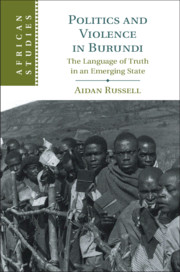Book contents
- Politics and Violence in Burundi
- African Studies Series
- Politics and Violence in Burundi
- Copyright page
- Contents
- Figures and Maps
- Acknowledgements
- Linguistic and Orthographic Note
- Glossary of Terms
- List of Abbreviations
- Introduction
- Prologue, 1796–1959
- Part I 1959–1961: ‘To See the Son of a King’
- Part II 1961–1967: ‘A Most Total Anarchy’
- Part III 1968–1972: ‘Please Send Me a Car to Take Them Away’
- Conclusion
- Bibliography
- Index
- African Studies Series
Prologue, 1796–1959
People of the Land
Published online by Cambridge University Press: 03 October 2019
- Politics and Violence in Burundi
- African Studies Series
- Politics and Violence in Burundi
- Copyright page
- Contents
- Figures and Maps
- Acknowledgements
- Linguistic and Orthographic Note
- Glossary of Terms
- List of Abbreviations
- Introduction
- Prologue, 1796–1959
- Part I 1959–1961: ‘To See the Son of a King’
- Part II 1961–1967: ‘A Most Total Anarchy’
- Part III 1968–1972: ‘Please Send Me a Car to Take Them Away’
- Conclusion
- Bibliography
- Index
- African Studies Series
Summary
This chapter provides an orientation in the people, place and time of the book’s setting. It examines the precolonial history of the kingdom of Burundi, including the parameters of ethnic identity, societal stratification and dynamics of power in the nineteenth century. Through German conquest and transfer to Belgian control after the First World War, it considers the nature of chiefly authority and colonial ethnic policy, brought into focus by civil war and anticolonial rebellion in the early twentieth century. Focusing subsequently on the relationship between a subject peasant population on the border and their imposed chief, Pierre Baranyanka, it explores the chief’s authority of ‘commandement’, and the popular evaluations of his behaviour. While required to perform deference and obedience, the peasant population talked about politics through keen observation of personal behaviour, gossiping about the chief’s attitudes towards the king, and exchanging jokes and parables that expressed political opinion about their social superiors. With the return of the first elite students to study abroad, the chapter ends with the arrival of the ‘time of politics’ in the north of Burundi.
Keywords
- Type
- Chapter
- Information
- Politics and Violence in BurundiThe Language of Truth in an Emerging State, pp. 39 - 62Publisher: Cambridge University PressPrint publication year: 2019



